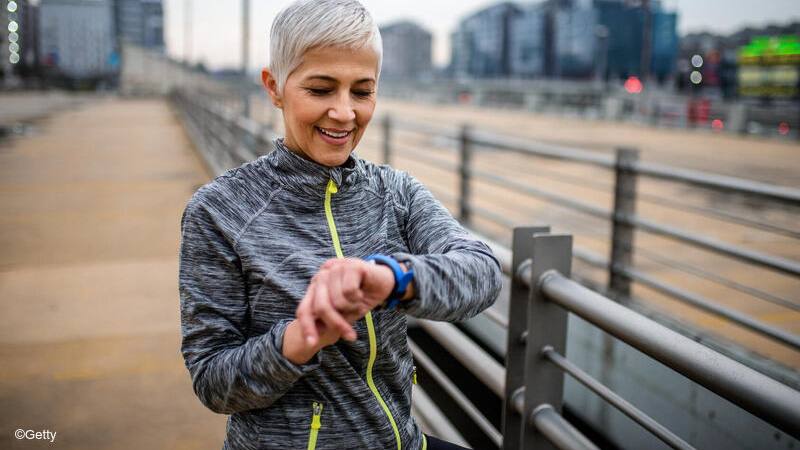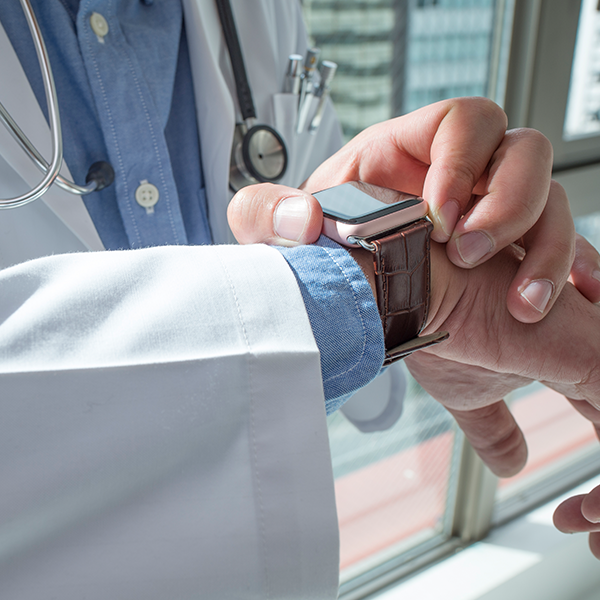-
Clinical Trials
Participants first: Shaping the future of clinical trials through digital innovation

Clinical trials advance medicine, but the National Institutes of Health says that more than half of studies are unable to recruit or retain the necessary research participants, which can exacerbate health disparities.
However, in recent years, digital technologies have helped trials become more accessible and inclusive. Clinical trials are moving out of traditional research facilities and into the everyday lives of participants.
“Instead of asking participants to come to us, we're going to them," says David Harmon, M.D., a Mayo Clinic cardiology fellow. "We're making it possible for people to participate in clinical trials without needing to travel outside their communities — often they can participate virtually from home."
A thematic review published in Mayo Clinic Proceedings examined the effect of digital innovation on clinical trial participation and how new technologies applied beyond the clinic walls may overcome the limitations of conventional trials.
Embedding research into patient care
Conventional clinical trials are conducted by staff delivering experimental treatments in a hospital or other clinical research facility. The new wave in research, known as "pragmatic trials," favors clinical trials embedded in real-world practice that adopt digital resources commonly used in patient care and apply them to virtual settings.
"There are a variety of digital solutions routinely used in clinical settings that are also invaluable in pragmatic clinical trials," says Dr. Harmon, first author. "These include electronic health records, online patient portals, and remote patient monitoring."
Researchers are finding innovative ways to use electronic health records and rapidly identify people who may be eligible for a trial. This approach shortens the time participants may need to wait before a trial can begin, increasing participant satisfaction.
Researchers are also improving efficiency by tapping into electronic health records to track participant outcomes, reducing the need for trial-related follow-up appointments or other contacts between study staff and participants beyond what is needed for patient care.
The goal is to create a "learning health system" using research to inform real-world decisions and transform clinical practice to benefit patients.
"Advances in machine learning, increases in computing power and storage, and the development of consumer-friendly medical and non-medical devices are making it possible to seamlessly integrate research and clinical practice and generate high-quality evidence rapidly," says Xiaoxi Yao, Ph.D., a cardiology-focused health services researcher at Mayo Clinic and the senior author of the review. "This evidence informs medical decision-making at all levels of a health care organization and is continually fed back into the system, which never stops learning and evolving."
Understanding real-world health
One thing that's always been challenging to evaluate in clinical trials is how a treatment may work in everyday life outside a hospital or clinic. Now, digital tools make that possible and provide a "digital window" into real-world health.
The average person may already have everything they need to participate in a clinical trial in the palm of their hand or strapped to their wrist. The researchers note that 85% of U.S. citizens own a smartphone, and 20% own a smartwatch or other wearable tech. Using these tools, people can participate in many clinical trial activities remotely — from enrolling in and consenting to a study to gathering and submitting study data — without traveling to a research facility or interrupting their daily lives.
When needed, researchers may also provide study-owned devices for participants to use and coordinate convenient ways for people to participate by visiting local health clinics, libraries or other community locations. These tactics help overcome barriers that might prevent people from participating in a trial.
"Our goal is to address health questions that are important to patients and their communities and questions that are critical for clinicians and health systems to inform their decision-making," says Peter Noseworthy, M.D., a Mayo Clinic cardiologist. "When possible, people should be allowed to participate in research within their own environment, at times convenient to them and in ways that require minimal additional burden."
Recognizing the limits
The researchers acknowledge the limitations of using digital technology in clinical trials. For example, reliance on technology may create bias and barriers for people who are underrepresented in research. The researchers cite a smartwatch-enabled heart health study in which reliance on participant-owned devices resulted in recruiting disproportionately younger, more tech-savvy participants who, due to their age, were less likely to have heart disease.
Pragmatic study designs, while intending to be less disruptive to participants, also may be so "hands off" that they result in shifting the labor of data collection from study staff to participants. A lack of in-person follow-up may leave participants wondering what to do to act on their study results.
Embracing choice and flexibility
While pragmatic design and digital innovation help scientists understand the clinical impact and real-world effectiveness of clinical trials, it's not a "one-size-fits-all" approach.
Hybrid trials combine elements of conventional design, such as in-person assessment, with digital elements, such as a mobile app for data collection. This flexibility can also be built into trials, allowing participants choices in how they interact with study staff or complete study requirements. According to Dr. Yao, this approach creates options for more inclusive participation.
“These digital solutions have enabled scientists to enhance inclusivity in clinical trials at all levels, from the research topics chosen to the geographic regions where research is conducted to the background of the people leading and participating in studies,” says Dr. Yao. “This creates a more robust learning health system that aims to generate evidence and cures meaningful to all people.”
Dr. Yao is the Robert D. and Patricia E. Kern Scientific Director for Pragmatic Trials and Evaluation in the Mayo Clinic Kern Center for the Science of Health Care Delivery. Dr. Noseworthy directs the Heart Rhythm and Physiologic Monitoring Laboratory at Mayo Clinic, which includes the externally available Cardiac Monitoring Program.
Mayo Clinic engages in clinical trial innovation nationally as a member of:
- Decentralized Trials & Research Alliance
- Clinical Trials Transformation Initiative
- Steering Committee - CTTI (ctti-clinicaltrials.org)
- The Multi-Regional Clinical Trials Center of Brigham and Women's Hospital and Harvard
This research was supported by the Mayo Clinic Center for Clinical and Translational Science, which is funded by Clinical and Translational Science Award grant UL1 TR000135 from the National Center for Advancing Translational Sciences.
—Caitlin Doran










